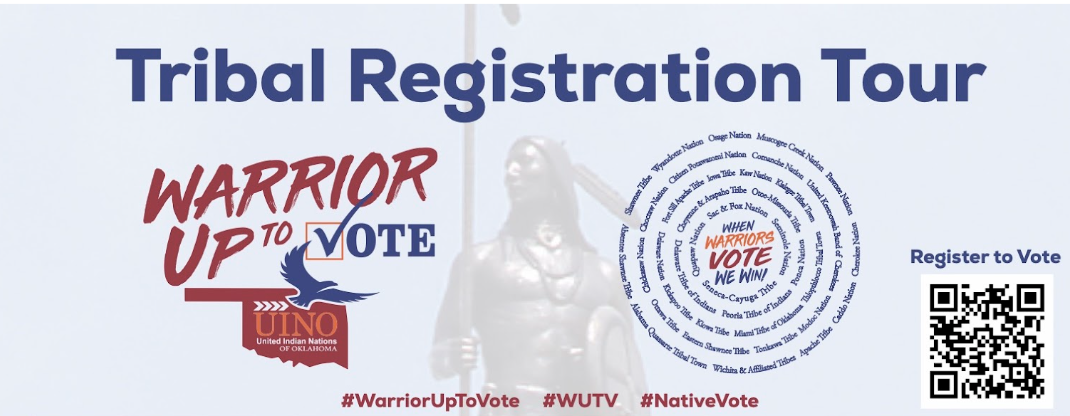Native Vote 2024. In Oklahoma, the United Indian Nations of Oklahoma (UINO) is launching its second bi-annual “Warrior Up to Vote” event, a statewide initiative to increase voter registration among Native Americans in Oklahoma. The tour will start Sept. 23 to Oct. 5.

Currently, Oklahoma ranks 50th in voter participation and registration, and Native Americans have some of the country's lowest voter registration and turnout rates. Warrior Up to Vote aims to change that. Tribal citizens in Oklahoma comprise 13 percent of the state's population.
The Warrior Up to Vote tour is committed to visiting as many tribal communities as possible before Oklahoma’s Oct. 11 voter registration deadline.
Ben Barnes, UINO Board Chairman, explains that voting is a right and can make huge impacts on issues affecting Indian Country.
"There are so many problems we feel we can't move the needle on because they seem insurmountable when we look at them as a whole. Societal issues such as education, healthcare, mental health and substance abuse seem impossible to overcome," said Barnes. "But registering to vote is a right. We can impact taxation, our tribal compacts and tribal sovereignty when we vote, which helps all those issues that disproportionately affect Native Americans. Whether you are a young person or an elder, no matter your background or education, voting is something we can all do to uplift our communities, and it requires minimal effort."
UINO received a grant from the National Congress of American Indians (NCAI), which will help UINO visit tribal nations, tribal complexes, and headquarters across Oklahoma.
As part of this tour, UINO will distribute voter registration materials to Tribal Nations and Native voters, including posters and flyers with QR codes that link directly to the online registration resources making registering to vote easier. Tribal nations are encouraged to display these materials in high-traffic areas such as social services offices, health centers, tribal tax offices and other community spaces.
Margo Gray, UINO Executive Director, is hoping that this tour will help turn out Native voters in record numbers.
"United Indian Nations of Oklahoma is mobilizing the Native vote like never before," said Gray. "With the support of our tribal leaders, we can reach more Natives than ever, and we can make our collective voices more impactful than ever. This tour is truly historic, and we are ready to Warrior up to Vote."
The Warrior Up to Vote tour is expected to make the following stops at tribal complexes and headquarters across Oklahoma:
- 9/23 Monday – Miami, OK – Shawnee, Miami, Peoria, Seneca Cayuga, Eastern Shawnee, Quapaw, Wyandotte, Ottawa and Modoc Tribal Nations
- 9/24 Tuesday – Vinita and Tahlequah, OK – Cherokee Nation and UKB Tribal Nations 9/25 Wednesday – Bartlesville & Pawhuska- Delaware Tribe of Indians and Osage Nation Tribal Nations
- 9/26 Thursday - Kaw City, Ponca City, Tonkawa – Kaw, Ponca and Tonkawa Tribal Nations
- 9/27 Friday – Redrock & Pawnee, OK - Otoe Missouria and Pawnee Tribal Nations
- 10/1 Tuesday – Perkins, Stroud, McCloud, OK - Iowa, Sac & Fox, Kickapoo Tribal Nations
More Stories Like This
Native News Weekly (August 25, 2024): D.C. BriefsUS Presidents in Their Own Words Concerning American Indians
NDAA passes House; Lumbee Fairness Act Advances
NFL, Vikings to Host Native All-American Game, Youth Flag Clinic
Senate Committee on Indian Affairs Passes 12 Bills to Strengthen Tribal Communities
Help us defend tribal sovereignty.
At Native News Online, our mission is rooted in telling the stories that strengthen sovereignty and uplift Indigenous voices — not just at year’s end, but every single day.
Because of your generosity last year, we were able to keep our reporters on the ground in tribal communities, at national gatherings and in the halls of Congress — covering the issues that matter most to Indian Country: sovereignty, culture, education, health and economic opportunity.
That support sustained us through a tough year in 2025. Now, as we look to the year ahead, we need your help right now to ensure warrior journalism remains strong — reporting that defends tribal sovereignty, amplifies Native truth, and holds power accountable.
 The stakes couldn't be higher. Your support keeps Native voices heard, Native stories told and Native sovereignty defended.
The stakes couldn't be higher. Your support keeps Native voices heard, Native stories told and Native sovereignty defended.
Stand with Warrior Journalism today.
Levi Rickert (Potawatomi), Editor & Publisher


